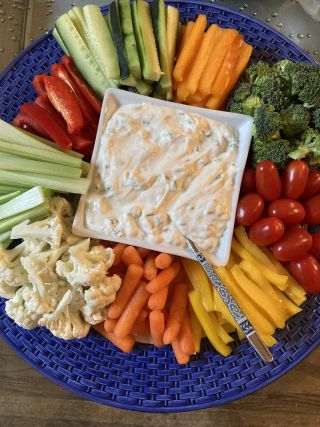Friends
Make a Comeback With Disco and Friendship
How veggies and dip support being with our friends.
Posted July 26, 2023 Reviewed by Gary Drevitch
Key points
- Friendship provides a sense of support and connection; it's even good for our health.
- We can let friendship make a comeback, dedicating time for reconnection.
- Veggies and dip is an easy-to-prepare, delicious, healthy recipe. Share it when friends come over.

Each year, for the past three years now, I invite dear friends to board a disco bus. There are always two surprise stops and no one knows where we’re going.
Our playlist is a joint effort—compiled of disco songs and other favorites that all of us have named.
While the occasion is my birthday, this is actually an excuse to get everyone together. The real celebration is one of friendship.
Whether friends for 30 years or just three weeks, the purpose of our get-together is to honor the history and healing of friendship. Future histories are also begun as new connections are made with one another.
Did I mention the annual disco sunglasses party favor?
Have you ever met up with an old friend after not seeing them for a long time? So often these encounters transport us back to a shared moment—our first time driving a car, having a party, or meeting in 9th-grade study hall.
A shared history forms the context for close friendships—unique bonds around awkward moments, old groups of friends, and nights to remember…or forget.
We relate to each other through paths of reconnection while returning, and maybe even reclaiming, that part of ourselves from another point in our lives. We recognize that shared experiences come with mutual understanding. Who else but that dear friend would know about when we were struggling? Lonely? Overwhelmed? Dealing with an illness? And vice versa.
This history of understanding encapsulates a space for healing. Authentic, heart-and-soul friendship is special. Its importance is framed by the space provided to reciprocally be who we truly are.
Who cares if we sing out of tune? Or are too loud when Gloria Gaynor comes on? (If that’s even possible!)
The authenticity of friendship means we don’t have to worry about what others think: The connection centers on being who we genuinely are. Hence, the outrageousness of the disco party bus with its silly quiz questions (e.g., What does the word discotheque mean?) and funny prizes (this year, dangly disco ball earrings).
The honesty of authentic friendship is an outlet for disclosing things we might not even be able to talk about with our significant other.
The context of history guides us.
Our disco party bus winds its way through the city, music blaring as we dance and talk, everyone absorbing what the others have to say. The power of friendship is apparent.
But wait; our playlist is interrupted with a startling finding: According to Koop’s (2022) analysis of the American Time Use Survey, we actually don’t spend much time with our friends. In fact, time with friends only makes our top-three during adolescence. By age 25, we spend most of our time alone, then with co-workers, followed by partners. This shifts slightly at 35 with most of our time spent alone, followed by being with children, and then with a partner. At age 45, the top-three ways we spend our time are alone, with children, and then with a partner; at 55, it's alone, then with a partner, and then co-workers. At ages 65 and 75, the top three are alone, partner, and family.
Where are the friends?
Surely this can’t mean that our friendships wane for good after our teen years? Has disco died?
These findings are even more worrisome given studies that show how important it is to have friends. Friendship furthers a sense of support (Amati et al., 2018). And they're actually good for our health (Cundiff et al., 2018).

I invite us to have friendship make a comeback in our lives. Just as nu-disco brought back disco music during COVID, let’s have nu-friendship do the same. Let’s enjoy the laughter, spontaneity, and history of acceptance that friendship embodies.
Here’s a simple, delicious Veggies and Dip recipe (Clauss-Ehlers & Clauss-Ehlers, 2022) to make for your get-together with friends—whether that happens on a bus or in your kitchen:
Ingredients
Veggies
8 oz peeled baby carrots
12 oz cherry tomatoes
1/2 head cauliflower, cut into florets
1 small head broccoli, cut into florets
1 large red bell pepper, stemmed, seeded, halved, and cut into 1/4-in strips
1 large yellow or green bell pepper, stemmed, seeded, halved, and cut into 1/4-in strips
5 celery ribs, cut into 3-in lengths, then cut into 1/4-in strips
1/2 bunch asparagus, cut into 3-in lengths, starting from the top of each
spear
1 English cucumber, peeled, seeded, and cut into 3-in lengths, then cut into 1/4-in strips
Creamy Chive Dip
1/2 cup good-quality mayonnaise
1/2 cup sour cream
¼ cup chopped chives
1 Tbsp garlic powder
1/4 tsp freshly ground black pepper
Fine sea salt
Serves 8.
Directions
Set your prepared veggies to one side as you make your dip.
To make the creamy chive dip, in a large bowl, mix together the mayonnaise, sour cream, chives, garlic powder, and pepper. Season with salt. Refrigerate for at least 1 hour.
Now for the fun part. With your helpers, arrange your prepared veggies around a large round serving platter, mixing the different colors. For example, a block of green, then a block of red, and then a block of orange. Continue around the platter until your veggies are used up. Then choose your veggie and dunk it in your dip.
Now get your playlist going!
Host a Get-Together to Be Intentional About Friendship
Let’s be intentional about friendship by hosting a get together. Think about the things you like to do, whether it’s listening to music, dancing, eating, swimming, or any other fun activity. Build your get-together around the thing you enjoy. Like a dance party! No matter how silly it may sound, if you care about what you’re doing, chances are your friends in attendance will, too.
Young Helpers (toddlerhood through school age children): Host a Playdate. With your grownup helper (e.g., your parent, grandparent, caregiver, or guardian) pick a day to invite friends over for a playdate. Organize activities like making Veggies and Dip that kids and grownups can enjoy together.
Preteen and Teen Helpers: Create a Playlist Together. Music is an important way to communicate. Invite your friends over to create a playlist. In learning about music preferences, chances are you’ll also learn more about your friends. Munch on Veggies and Dip while you listen and converse.
Grown-Up Helpers: Have a Night Out or a Night In. Friendship is important for our souls, our minds, and even our health. Being intentional about friendship means we reach out to make a connection plan. Whether it's once a month or once a year, having a regular get-together lets our friend group know we will meet again. The assurance provides a community context to guide us, encouraging us to shout out, as Donna Summer would say, “I feel love!”
References
Amati, V., Meggiolaro, S., Rivellini, G., & Zaccarin, S. (2018). Social relations and life satisfaction: The role of friends. Genus, 74(1), 7. doi: 10.1186/s41118-018-0032-z
Clauss-Ehlers, J.C.E., & Clauss-Ehlers, C.S. (2022). Eating together, being together: Recipes, activities, and advice from a chef dad and psychologist mom. Princeton Architectural Press.
Cundiff, J.M., & Matthews, K.A. (2018). Friends with health benefits: The long-term benefits of early peer social integration for blood pressure and obesity in midlife. Psychological Science, 29(5), 814-823. doi: 10.1177/0956797617746510
Koop, A. (2022, October 28). Visualized: Who Americans spend their time with. Visual Capitalist. https://www.visualcapitalist.com/who-americans-spend-their-time-with/




